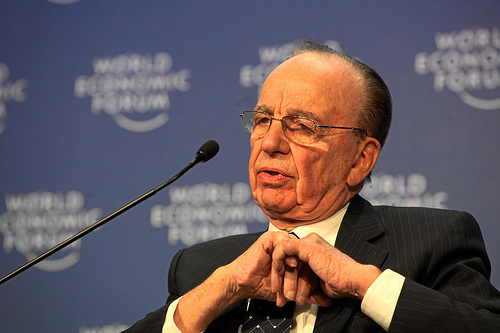Rupert Murdoch’s News Corporation is bidding for outright ownership of British Sky Broadcasting (BSkyB), of which it already owns a 39% stake. The move has been met with opposition from British media rivals, including the BBC and The Daily Telegraph, who are appealing to the British government and the media regulator, Ofcom. Sky has dominated pay television in Britain and Ireland over the last decade, and continued to grow throughout the recession. So, just how good is Sky, and what will happen if News Corp. gains ownership of it?
To the answer the first part of that question, Sky is very good. In terms of customers, it will soon deliver satellite television to ten million households. While ITV and Channel 4 have been losing revenue in recent years, Sky beat the expectations of analysts last week when it announced that pre-tax profit between July and September increased by 24 per cent to £230 million, and sales increased by 15 per cent to £1.53 billion.
Sky was not always in such rude health. It grew out of a network founded by Murdoch in the late 1980s. For a while it was such a drain on News Corporation that the parent company came close to bankruptcy.
Much credit must go to Tony Ball, who ran Sky between 1999 and 2003. He managed to increase the subscriber base from 3.5 million to 6.9 million in that period. Under his management, Sky switched its customers from analogue to digital television and pioneered the iconic “Sky box”.
The company’s further growth was based primarily on two things: customer service and football rights. Sky Sports has played no small role in elevating the Premier League to being the richest football league in the world.
James Murdoch took over from Ball, a controversial decision at the time which was reflected in a fall in share prices. Murdoch’s performance justified the choice. Under his control, Sky soared ahead of its rivals on the technology front. It began to shape not only what its customers watched, but how they watched it.
Sky has maintained this emphasis on television technology, pioneering 3D and mobile television, as well as the distribution of programmes through games consoles. Almost 3 million customers now pay for high-definition channels. It has also managed to diversify its operations horizontally into broadband and phone services, helping drive average revenues per user to £508 in the 2009-10 fiscal year, up from £427 two years earlier.
The firm has proved to be relatively recession-proof, but its continued success is now threatened more by regulation than by competitors.
With that in mind, let us return to the second part of our question, concerning the consequences of a successful takeover by News Corporation. A case could be made that not that much would change at all, as News Corp. already controls Sky’s activities. Some fear that ownership would add to Murdoch’s already considerable influence in world media. An alliance of newspapers, broadcasters and platform owners has expressed concerns that a merger between the UK’s largest newspaper group and pay-TV company would reduce diversity.
Opposition to the bid comes not only from competitors, but also from shareholders of Sky. Some investors suspect Murdoch might use Sky’s cash in ways which benefit News Corp. rather than itself.
Murdoch has been guilty of such practices before. In acquiring Hughes Electronics, News Corp. will transfer $4.5 billion of debt to Fox News. This decision could be crucial. Right now, the world is watching the British authorities.
In ten years time, we could all be watching Sky. In twenty years time, it’s not too much to speculate that Rupert Murdoch could be watching all of us.






